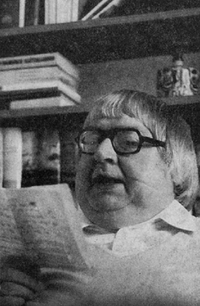Karl Schröter
| Karl Schröter | |
|---|---|

Picture of Karl Schröter studying.
|
|
| Born |
September 7, 1905 Biebrich near Wiesbaden |
| Died | August 22, 1977 (aged 71) Berlin |
| Citizenship | German |
| Alma mater |
Göttingen Heidelberg Frankfurt am Main University of Münster |
| Known for |
semantic consequences provability logic |
| Scientific career | |
| Fields |
Mathematics Logic |
| Institutions | University of Münster |
| Doctoral advisor | Heinrich Scholz |
Karl Walter Schröter (* 7 September 1905 in Biebrich near Wiesbaden, † 22 August 1977 in Berlin) was a German mathematician and logician. Later on, after the war, he made important contributions concerning semantic consequences (German: semantische Folgerungsrelationen) and provability logic (German: syntaktische Ableitbarkeitsrelationen). He worked as a mathematical theoretician and cryptanalyst for the civilian Pers Z S, the cipher bureau of the Foreign Office (German: Auswärtiges Amt), from Spring 1941 to the end of World War II.
From 1928 to 1936, Schröter studied mathematics, physics, philosophy, and psychology at the Universities of Göttingen, Heidelberg and Frankfurt am Main. Due to family reasons he had to interrupt his studies several times. He then worked in the mathematical logic group at the University of Münster lead by Heinrich Scholz. From April 1, 1939, he was a research assistant at the Department of Philosophy at the University of Münster. On 20 December 1941, he took his examination for promotion of Dr. phil under the logician Heinrich Scholz studying mathematics, logic, and calculus with a thesis titled Ein allgemeiner Kalkülbegriff (English: A General Concept of Calculus). On April 1, 1941, he took a leave of absence to join Pers Z S, the Foreign Office civilian cipher bureau, working as a mathematician. However, even during this time he continued to work on problems of basic mathematical research.
...
Wikipedia
